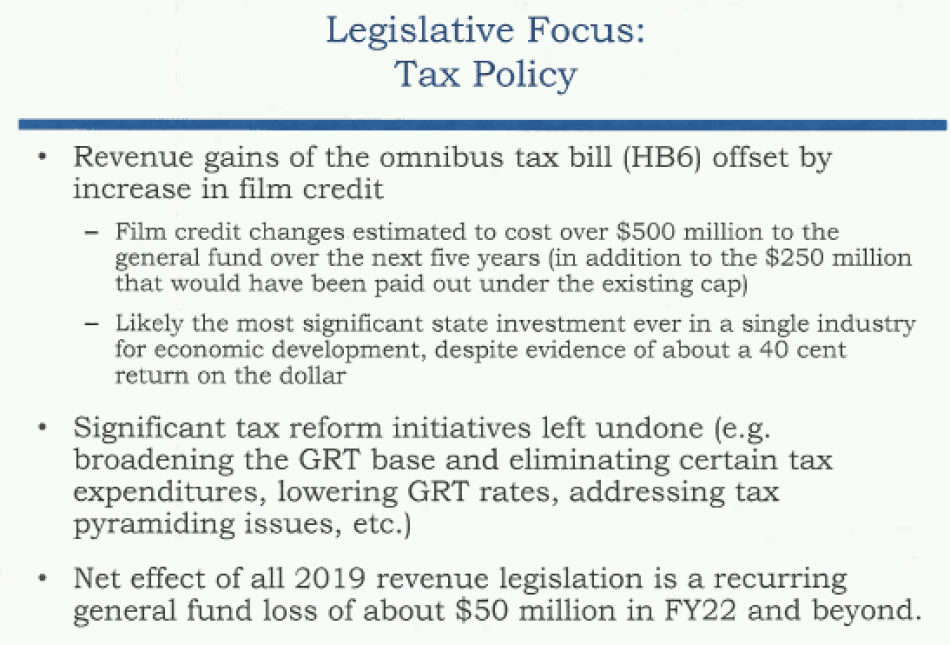Legislative analysts agree: Film subsidies are money-loser


For years the Rio Grande Foundation has attempted to educate New Mexicans on the bad economics of film subsidies. The program which actually began under then Gov. Gary Johnson was enhanced by Bill Richardson when he and the Legislature made it state policy to return 25 cents for every dollar spent in the State to the film industry.
The amount that could be spent in support of the film industry was uncapped during the Richardson Administration leading to some wild swings in annual subsidy payments. That situation was partially resolved during the Martinez Administration when a $50 million annual cap was placed on payouts, but subsidies could (and did) accumulate above that amount.
As we (and others) have pointed out, this is the single most generous business subsidy offered by the State of New Mexico. Both economically and morally it is one thing to exempt a business from taxes that would otherwise be paid (think Industrial Revenue Bonds and their long-term property tax exemptions), it is another thing entirely for government to cut checks (using our tax dollars) to fund the ongoing operations of chosen businesses.
Even LEDA which does result in tax dollars being paid out to businesses locating new facilities in New Mexico is a one-time funding mechanism.
But under New Mexico’s film program our taxes are collected and handed over to film companies doing business in New Mexico. That fact was laid bare for the public to see when, shortly prior to the 2019 legislative session, it was reported that the State owed hundreds of millions of dollars to the film industry. In the 2019 session the Legislature agreed to appropriate (up to) $250 million to pay off that “debt.”
That payment would be a sensible use of the surplus if the Legislature at the same time enacted policies to wean the film industry away from ongoing government subsidies. Instead, the Legislature in SB 2 expanded the cap to $110 million annually and also allowed film producers unlimited subsidies if they have a qualified production facility within the State.
We know this will be a boon for Hollywood filmmakers, but what about New Mexico’s economy? New Mexico’s top fiscal leaders, Rep. Patty Lundstrom, Vice Chair of the Legislative Finance Committee, and Director David Abbey recently gave a presentation in which they discussed tax and budget changes made during New Mexico’s 2019 session.
They note that “film credit changes are estimated to cost $500 million to the General Fund over the next five years (in addition to the $250 million that would have been paid out under the existing cap). Also, they note that the revised film program is “likely the most significant state investment ever in a single industry…despite evidence of about a 40 percent return on the dollar.”
To say the least, this echoes what the Rio Grande Foundation has been saying for more than a decade. We are happy to have films made here, but the policy of opening up the State’s Treasury to ANY corporation is an economic loser.
Recently, Gov. Lujan-Grisham has been in the media encouraging film productions originally-slated for Georgia to come to New Mexico. Due to the Peach State’s own generous subsidies, Georgia has attracted a number of productions, but recently-adopted abortion limits have rankled some in Hollywood who are threatening to shift production elsewhere.
Ironically, due to the money-losing economics of film subsidy policies in both states, a film boycott could be a boon for Georgia’s overall economy and an even-bigger boondoggle for New Mexico’s which could see the annual film program’s costs skyrocket. Already, as Rep. Lundstrom and Mr. Abbey point out the subsidy program will cost an estimated $150 million annually.
This largesse targeted at one industry may seem affordable at a time of billion-plus dollar surpluses thanks to booming oil production in the Permian Basin, but at some point oil prices will fall for a sustained period or the spending aspirations of New Mexico’s Legislature will grow too quickly for oil revenues to maintain.
Paul Gessing is the President of New Mexico’s Rio Grande Foundation. The Rio Grande Foundation is an independent, non-partisan, tax-exempt research and educational organization dedicated to promoting prosperity for New Mexico based on principles of limited government, economic freedom and individual responsibility
